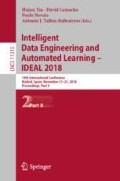Abstract
This paper suggests a new approach for radicalization detection using natural language processing techniques. Although, intuitively speaking, detection of radicalization from only language cues is not trivial and very debatable, the advances in computational linguistics together with the availability of large corpus that allows application of machine learning techniques opens us new horizons in the field. This paper advocates a two stage detection approach where in the first phase a radicalization score is obtained by analyzing mainly inherent characteristics of negative sentiment. In the second phase, a machine learning approach based on hybrid KNN-SVM and a variety of features, which include 1, 2 and 3-g, personality traits, emotions, as well as other linguistic and network related features were employed. The approach is validated using both Twitter and Tumblr dataset.
Access this chapter
Tax calculation will be finalised at checkout
Purchases are for personal use only
References
Abbasi, A., Chen, H.: Applying authorship analysis to extremist-group web forum messages. Intell. Syst. 20(5), 67–75 (2005)
Bowman-Grieve, L.: Exploring “stormfront:” a virtual community of the radical right. Stud. Confl. Terror. 32(11), 989–1007 (2009)
Bouchard, M., Joffres, K., Frank, R.: Preliminary analytical considerations in designing a terrorism and extremism online network extractor. In: Mago, V., Dabbaghian, V. (eds.) Computational Models of Complex Systems, pp. 171–184. Springer, New York (2014). https://doi.org/10.1007/978-3-319-01285-8_11
Brynielsson, J., Horndahl, A., Johansson, F., Kaati, L., Martenson, C., Svenson, P.: Analysis of weak signals for detecting lone wolf terrorist. In: Proceedings of the European Intelligence and Security Informatics Conference, Odense, Denmark, pp. 197–204 (2012)
Chen, H.: Dark Web: Exploring and Data Mining the Dark Side of the Web. Springer, New York (2012). https://doi.org/10.1007/978-1-4614-1557-2
Cohen, K., Johansson, F., Kaati, L., Mork, J.: Detecting linguistic markers for radical violence in social media. Terror. Polit. Violence 26(1), 246–256 (2014)
Davidson, T., Warmsley, D., Macy, M., Weber, I.: Automated hate speech detection and the problem of offensive language. In: Proceedings of ICWSM (2017)
Foong, J.J., Oussalah, M.: Cyberbullying system detection and analysis. In: European Conference in Intelligence Security Informatics, Athens (2017)
Frank, R., Bouchard, M., Davies, G., Mei, J.: Spreading the message digitally: a look into extremist content on the internet. In: Smith, R.G., Cheung, R.C.-C., Lau, L.Y.-C. (eds.) Cybercrime Risks and Responses: Eastern and Western Perspectives, pp. 130–145. Palgrave Macmillian, London (2015). https://doi.org/10.1057/9781137474162_9
Kostakos, P., Oussalah, M.: Meta-terrorism: identifying linguistic patterns in public discourse after an attack. In: SNAST 2018 Web Conference (2018)
Mei, J., Frank, R.: Sentiment crawling: extremist content collection through a sentiment analysis guided web-crawler. In: Proceedings of the International Symposium on Foundations of Open Source Intelligence and Security Informatics, Paris, France, pp. 1024–1027 (2015)
O’Callaghan, D., et al.: Uncovering the wider structure of extreme right communities spanning popular online networks (2013). https://arxiv.org/pdf/1302.1726.pdf
Sageman, M.: Leaderless jihad: Terror networks in the twenty-first century. University of Pennsylvania Press, Philadelphia (2008)
Salem, A., Reid, E., Chen, H.: Multimedia content coding and analyzis: unraveling the content of Jihadi extremist groups’s video. Stud. Confl. Terror. 31(7), 605–626 (2008)
Wang, J., Cong, G., Zhao, W.X., Li, X.: Mining user intents in Twitter: a semi-supervised approach to inferring intent categories for tweets. In: AAAI (2015)
Weimann, G.: The psychology of mass-mediated terrorism. Am. Behav. Sci. 52(1), 69–86 (2008)
Weimann, G.: Terror on Facebook, Twitter, and YouTube. Brown J. World Affairs 16(2), 45–54 (2010)
Zhou, H., Wang, J., Wu, J., Zhang, L., Lei, P., Chen, X.: Application of the hybrid SVM-KNN model for credit scoring. In: 2013 Ninth International Conference on Computational Intelligence and Security (2013). https://doi.org/10.1109/cis.2013.43
Scrivens, R., Davies, G., Frank, R.: Searching for signs of extremism on the web: an introduction to sentiment-based identification of radical authors. Behav. Sci. Terror. Polit. Aggress. 10(1), 39–59 (2017)
Author information
Authors and Affiliations
Corresponding author
Editor information
Editors and Affiliations
Rights and permissions
Copyright information
© 2018 Springer Nature Switzerland AG
About this paper
Cite this paper
Oussalah, M., Faroughian, F., Kostakos, P. (2018). On Detecting Online Radicalization Using Natural Language Processing. In: Yin, H., Camacho, D., Novais, P., Tallón-Ballesteros, A. (eds) Intelligent Data Engineering and Automated Learning – IDEAL 2018. IDEAL 2018. Lecture Notes in Computer Science(), vol 11315. Springer, Cham. https://doi.org/10.1007/978-3-030-03496-2_4
Download citation
DOI: https://doi.org/10.1007/978-3-030-03496-2_4
Published:
Publisher Name: Springer, Cham
Print ISBN: 978-3-030-03495-5
Online ISBN: 978-3-030-03496-2
eBook Packages: Computer ScienceComputer Science (R0)

